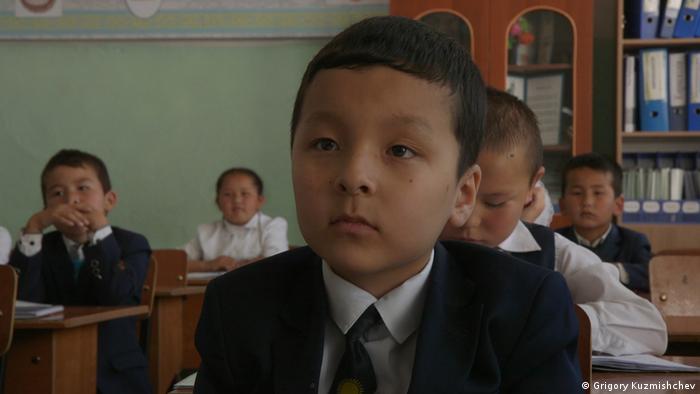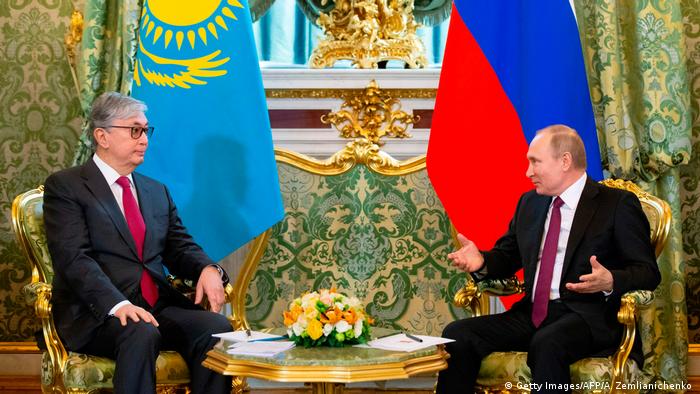Deutsche Welle article 01.07.2019
Kazakhstan has given itself seven years to transition from the Cyrillic to the Latin alphabet, in a push to modernize the Central Asian country. But at a village school, not everyone is so sure about the mammoth change.
Kasakhstan plans switch from Cyrillic to Latin alphabet
Around 25 first grade school students are excitedly chanting the alphabet. Their gaze hardens as they concentrate on writing basic words in their lined notebooks, slowly tracing the curves of each letter. The pupils at the village school in Kainazar near the city of Almaty have been practicing the Cyrillic alphabet in their Kazakh language classes since the beginning of the year. But soon they will have to relearn everything from scratch.
In 2017, Kazakhstan’s then president and long-term leader Nursultan Nazarbayev signed a decree on the switch from the Cyrillic to the Latin alphabet. By 2025, everything in the country — from school textbooks and literature to street signs and official documents — will have to be quite literally rewritten. There is now a final Kazakh version of the Latin alphabet, with 32 letters — including nine letters that are uniquely Kazakh sounds.
The country’s new president Qassym-Jomart Tokaev called the gradual change an important stage of Kazakhstan’s “spiritual modernization,” pointing out that “90% of the information worldwide is published in the Latin alphabet.” According to state media, the government plans to spend around 218 billion tenge, around €505 million or $595 million, on the various stages of the transition. In April, the country’s National Bank issued new “rewritten” coins. Part of the plan is to use code to digitally convert things written in Cyrillic to the Latin script. From 2021 the alphabet will be officially introduced to the public.
Read more: Kazakhstan elects Tokayev as Nazarbayev successor as hundreds protest
Teachers will be retrained and will begin teaching the new alphabet next year, starting from the first grade and adding older year groups gradually. But in the Shokan Ualikhanov School in Kainazar, the change is already a worry for some of the staff.
 Teachers at a local village school are concerned the transition to the Latin script will be tough on them
Teachers at a local village school are concerned the transition to the Latin script will be tough on them
The weight of change
The first grade’s Kazakh teacher Mirash Alimzhanova says she isn’t too concerned about her pupils having to relearn their alphabet. “They learn everything quickly,” she laughs, adding that the fact that pupils here have English lessons starting from first grade will help them. “But we teachers will find it harder because we are already used to one alphabet,” she adds.
Aigul Ibrahimova, the deputy head of pastoral support at the school, explains that many of the teachers are concerned that the main weight of the change will land on their shoulders. “Parents wont be able to help with the transition to Latin alphabet because they haven’t learnt it themselves. So the children will only be able to learn in school. Parents won’t be able to help with homework anymore,” she explains, as some of the younger pupils crowd around her after their lunch break.
Read more: Nursultan, not Astana — Kazakhstan renames capital to honor Nazarbayev
Linguistic acrobatics are already part of every day life in Kazakhstan, including in Kainazar. The school is bilingual, like many of its students. Parents chose whether their children will attend classes in the Kazakh language or the Russian language. Both are official languages in Kazakhstan and both can be heard in this schoolyard.
Shedding Soviet skin
This will be the third time Kazakhstan has changed alphabets in the last 100 years. In 1929, Kazakhs switched from the Arabic script to the Latin script, as the Soviet Union pushed to create a secular education system. In 1940, Kazakhstan switched to the Cyrillic alphabet. Nationalities in the Soviet Union had the right to education in their own language, but the change was still supposed to create overall unity and is seen as a move towards “Russification.”
Now Kazakhstan is trying to shed its Soviet past, albeit much later than many neighboring countries, where Turkic languages are also spoken. Azerbaijan switched from the Cyrillic to the Latin alphabet in 1991, just after the fall of the Soviet Union, while Uzbekistan and Turkmenistan made the change in 1993.
Kazakstan’s move can also be seen as a step to distance from neighboring Russia as well, however. Kazakh authorities have been at pains to emphasize that Russia remains an important ally for the Central Asian country. Russia is one of Kazakhstan’s top trade partners.
According to political scientist Aidos Sarym, concern over the way Russia would take the move could explain why Kazakhstan waited longer than its neighbors to switch alphabets. It was almost inevitable that Russia’s elites would take the step as a “personal blow, as a departure from [Russia’s] sphere of media influence and political influence,” Sarym tells DW.
Tipping the balance
But Sarym says there is another reason that the change in Kazakhstan comes later than in neighboring countries. The Russian language is far more than an administrative overhang from the Soviet Union in Kazakhstan. Though ethnic Kazakhs make up the majority of the population, nearly everyone in the country speaks fluent Russian. The last census in 2009 shows that while 74 percent of people understand Kazakh, more than 94 percent understand Russian. But the Kazakh government has declared that it wants to switch that balance in the coming years.
Political scientist Aidos Sarym sees it as part of an attempt to create a country based more on “Kazakh values.” He explains that the move away from Cyrillic also reflects a natural change in the country’s population, which is becoming increasingly ethnically Kazakh. “In the past few years a huge generation of people have grown up who speak Kazakh and who have demands and are articulating those demands,” Sarym explains. “The government has to react to these changes.”
A new generation
Back in Kainazar, the director of the village school is optimistic that in the long run, the change from Cyrillic to Latin script will be positive — despite the worries of some of his teaching staff. A metallic sign with his name — Tabyskhan Tatukhanovich — hangs outside the small office. It is already written in Latin letters.
“I think the change is the demand of our time — with IT-technology and the World Wide Web. I think it is a positive thing,” Tatukhanovich explains. He adds that he thinks knowing the Latin alphabet will help the pupils at the school learn English. “It will be easier for them to read scientific papers and literature that way,” he says.
Outside, in the courtyard several of the school’s eighth grade girls seem to agree. Though they usually aren’t allowed to use their phones on school premises, their teachers make an exception to allow them to show DW how they use the new alphabet. The girls say they’ve already taught it to themselves and now they use it to chat to their friends on social media. However it’s written, it seems the joys of teenage gossip endure.



China
Local time: 05:50
Member
English to Chinese
+ ...
After generations, people will not be able to read their history and books from before. Not everything will be rewritten in the new words
Argentina
Local time: 18:50
English to Spanish
+ ...
Turkey did it at the beginning of the XXth C and they are fine. Historians can rewrite things and people who are interested in reading sources can learn the old language, just as it is done today with medieval books.
Ukraine
English to Russian
+ ...
Without real WHY and WHAT FOR, it does look like a mere nation attempt rape, as "the rape of Europa". Even the statement "to shed the Soviet past" can't change the history, let alone "simpler for texting" is but ridiculous.
Who asked the people?
I believe that in all aspects the Kazakhs are closer to Russian, Iranian, or some hieroglyphs at least, not the dead Latin. Perhaps, that's one of the reasons.
India
Local time: 03:20
Member (2011)
Russian to English
+ ...
Latin script is being used all across the former Soviet republics for over twenty five years due to the access to internet and computers. Hence switching over to Latin from Cyrillic will not be such a difficult thing. It is just a few characters in Kazak language that will take some doing.
Spain
Local time: 23:50
Spanish to English
+ ...
I find this news disappointing. The Cyrillic alphabet is very practical and can express sounds which in Latin alphabets have to be expressed with consonant clusters (like the "stch" in Christchurch).
In my view, they'd be better shedding their despotic rulers instead.
Panama
Local time: 16:50
Spanish to English
+ ...
I love it. Now I can easily learn this language as I already know Turkish.
United Kingdom
Local time: 22:50
Portuguese to English
+ ...
I find this news disappointing. The Cyrillic alphabet is very practical and can express sounds which in Latin alphabets have to be expressed with consonant clusters (like the "stch" in Christchurch).
In my view, they'd be better shedding their despotic rulers instead.
Every nation has a right to discard systems imposed by an occupying empire. Russification under the Soviet Union was an abomination imposed on many nations, and in this country's particular case the USSR decided to abolish the Arabic alphabet to alienate the Muslim populations from their own culture.
Well done Kazakhstan.
Ukraine
English to Russian
+ ...
0) What is the reason (damage?), the purpose, and the price?
1) What do the Kazakh people think? (no translators here?)
2) Why there was no Referendum?
3) There're three (3) alphabets in KZ nowadays; if not Cyrillic, why Latin--not historically Arabic then?
Doesn't it "alienate" the Muslim populations from their own culture and the stuff?
Cui prodest, I wonder?
Australia
Local time: 07:50
Member (2008)
English to Russian
+ ...
Every nation has a right to discard systems imposed by an occupying empire. Russification under the Soviet Union was an abomination imposed on many nations, and in this country's particular case the USSR decided to abolish the Arabic alphabet to alienate the Muslim populations from their own culture.
Well done Kazakhstan.
Sadly, Aboriginal people were not asked by the British Empire which imposed not only English but also Latin alphabet on them. It is also sad when people think about politics only disregarding practical side of the things.
United States
Local time: 16:50
English to Russian
+ ...
You've conveniently overlooked the tiny fact that no one had asked the nation.
The "abomination" ensured 100% literacy of the Kazakh population in the Soviet era. No matter what alphabet was used for that purpose, it was a good thing all around. Along with an access to all the wealth of science and culture available in Russian. Doctors, engineers, scientists graduated from the best Russian colleges and used Russian to the advantage of the Republic of Kazakhstan, and... See more
You've conveniently overlooked the tiny fact that no one had asked the nation.
The "abomination" ensured 100% literacy of the Kazakh population in the Soviet era. No matter what alphabet was used for that purpose, it was a good thing all around. Along with an access to all the wealth of science and culture available in Russian. Doctors, engineers, scientists graduated from the best Russian colleges and used Russian to the advantage of the Republic of Kazakhstan, and continue to do so till this day. ▲ Collapse
Japan
Local time: 06:50
Japanese to Portuguese
+ ...
I would be worried if the Kazakhs wanted to migrate from Cyrillic letters to 汉字 (hanzi: Chinese characters). 😟 ▲ Collapse
Japan
Local time: 06:50
Japanese to Portuguese
+ ...
Well, since Kazakh is a TURKIC language I cannot see why it should use the Cyrillic alphabet. I don't know of any specific writing system for languages of Turkish origin and think that the Latin Alphabet is quite useful for the purposes of reflecting any spoken language with the appropriate arrangements. By the wa... See more
Well, since Kazakh is a TURKIC language I cannot see why it should use the Cyrillic alphabet. I don't know of any specific writing system for languages of Turkish origin and think that the Latin Alphabet is quite useful for the purposes of reflecting any spoken language with the appropriate arrangements. By the way, Latin isn't dead as long as there are Latin languages and it is used in the Vatican and language for science. ▲ Collapse
Türkiye
Local time: 00:50
English to Turkish
+ ...
On the linguistic aspect, I must say that I am glad because now many more Turkish people will be able to communicate with and understand Kazakh people much easier. You may say that this thought of mine is silly, and alphabet has nothing to do with language comprehension. But I rather think it does. An example to that is Turkish and Azerbaijani. We can perfectly understand the Azerbaijani of the Republic of Azerbaijan. We can also perfectly understand the Azerbaijani of South Azerbaijan(located in Iran) as well, but they may use Persian alphabet(which is a policy of Iran) and it sometimes can cause our inability to communicate with each other. So, we can say that alphabet is not all that takes to understand a fellow language, but it does matter. I am sure that with a little curiosity and ambition we Turkish people will understand the Kazakh language better and more easily, once it has rewritten its alphabet in Latin-scripted alphabet. ▲ Collapse
Brazil
Local time: 18:50
Russian to Portuguese
+ ...
I find this news disappointing. The Cyrillic alphabet is very practical and can express sounds which in Latin alphabets have to be expressed with consonant clusters (like the "stch" in Christchurch).
In my view, they'd be better shedding their despotic rulers instead.
I see that I am not alone here, I also find it quite disappointing! I like Latin to learn Latin or Portuguese language, Latin alphabet sounds different in Portuguese, French, English, German... It's not a practical alphabet, I think. Compare Polish language (written in Latin) and Russian (written with Cyrillic), with all respect, but Polish looks really exotic due to the ammount of letters to form a single sound!
Brazil
Local time: 18:50
Russian to Portuguese
+ ...
I find this news disappointing. The Cyrillic alphabet is very practical and can express sounds which in Latin alphabets have to be expressed with consonant clusters (like the "stch" in Christchurch).
In my view, they'd be better shedding their despotic rulers instead.
Every nation has a right to discard systems imposed by an occupying empire. Russification under the Soviet Union was an abomination imposed on many nations, and in this country's particular case the USSR decided to abolish the Arabic alphabet to alienate the Muslim populations from their own culture.
Well done Kazakhstan.
What was so bad about this "Russification"? Most of arboriginal people of Central Asia requested the protection of Russian tzars and joined Russian Empire in order to protect themselves from another empires (including the Turkish one). In many countries of Central Asia people got literacy with Cyrillic alphabet and Russian language. How many universities Kazakhstan knew before Russians and specially before Soviet Union?
To report site rules violations or get help, contact a site moderator:
You can also contact site staff by submitting a support request »
This discussion can also be accessed via the ProZ.com forum pages.